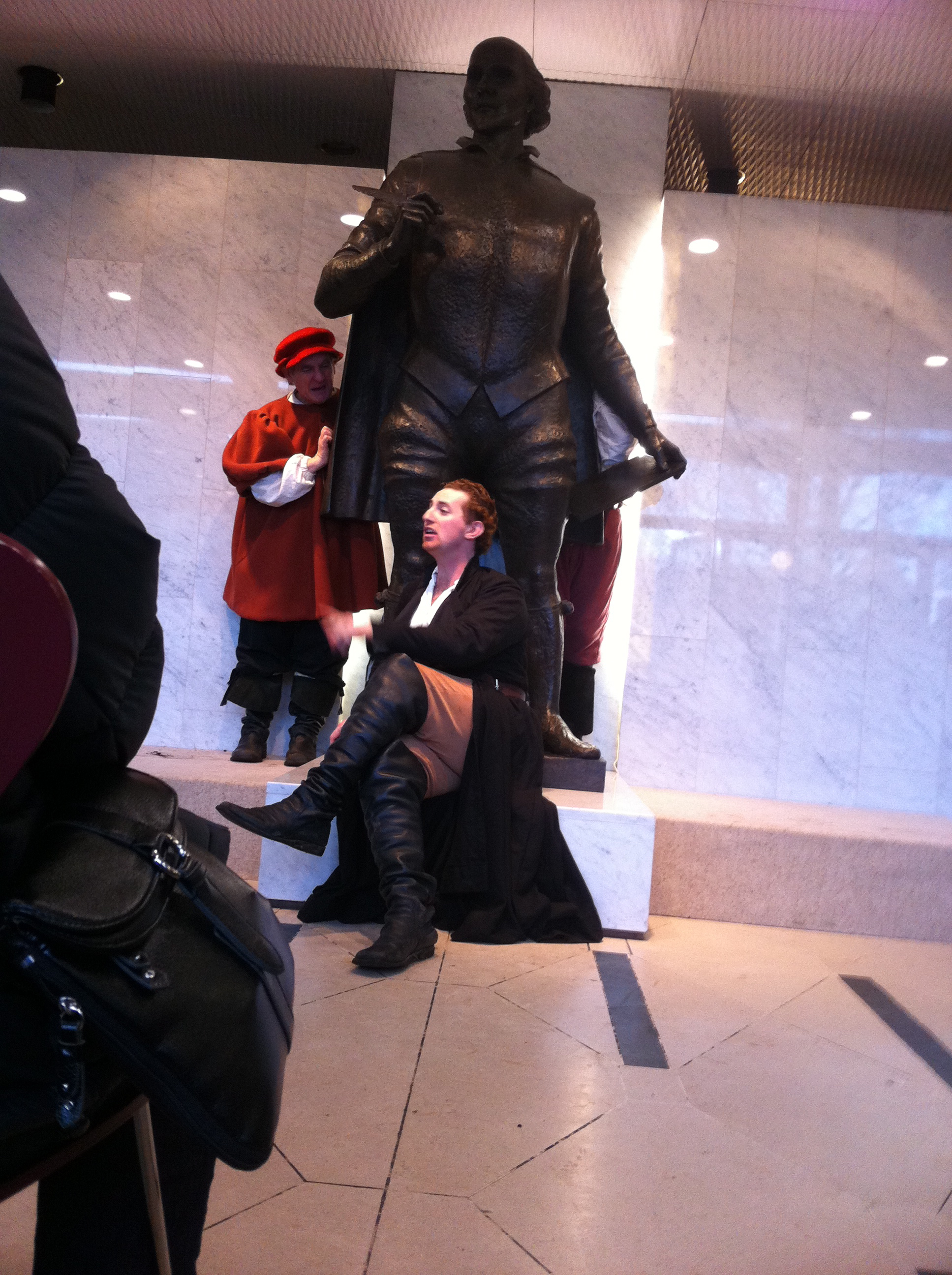
January 6, 2013, by Peter Kirwan
Twelfth Night (Shakespeare Aloud!) @ The Shakespeare Centre, Stratford
Shakespeare Aloud! is the in-house acting team at the Shakespeare Birthplace Trust, offering what they refer to as a ‘jukebox Shakespeare’ for tourists, where bitesize segments, songs, speeches are delivered on demand to the visitors at the houses. It offers added value for visitors and seems to fit in with the casual engagement with Shakespeare on which the heritage side of the organisation thrives.
As this year’s Twelfth Night (January 6th, of course) celebrations, the company for the first time extended its repertoire by putting on a full play, performed four times a day over the Twelfth Night weekend. While still heavily cut at only 45 minutes long, Twelfth Night invited visitors to engage in a very different way with Shakespeare, moving from quotation and immediate recognition of phrases to sustained character and narrative.
An impressive audience crammed into the small reception room of the Shakespeare Centre, with the Trust’s huge statue of Shakespeare dominating the stage. The occasion was informal and maintained something of the tourist atmosphere as audience members came and went, but this only allowed the actors to interact with their audience, encourage young children to take part in the action (holding onto Malvolio’s letter, for example) and laughing at their own mishaps.
With only two days’ rehearsal, the company had done a quite marvellous job. An impressive amount of the narrative was retained, with only Fabian entirely absent. The Sebastian-Antonio plot line was trimmed to its barest bones. While Sebastian appeared briefly on stage at the same time as Viola early on, all other appearances were cut until Antonio turned up inexplicably to save Viola during the duel. Sebastian turned up properly only in time to be slapped in the face by Andrew then dragged offstage by a faintly wild Olivia, and did not speak until the final reunion. While those unfamiliar with the play may have struggled to work out who these characters were, the late introduction of Sebastian and his shocked passivity actually worked remarkably well. Humour was drawn from the character’s sudden intervention in a chaotic world that we understood but he didn’t – thus, we were enabled to see something of how bizarre and wonderful events were for him.
The 7-person cast doubled Feste and Orsino, Maria and Sebastian, and Olivia and Antonio, and all characters were writ large. Feste’s bumbling clown had a sweet simplicity to him, and the reunification scene was played suitably slowly, but beyond this the company worked at breakneck scene for the fullest laughs. A fiery Olivia left neither Cesario nor Sebastian time to react to her advances; a bawdy Maria aimed her backside at the departing Malvolio; and Andrew and Toby engaged in a series of entertainingly energetic dances while Feste led them in song. With big gestures and no pauses, the audience were reduced to hysterical laughter.
Malvolio was a particular delight, reduced in this to a particularly smug villain. He played up to the audience, sneering at children as they laughed at him, strutting round the stage reading his letter while the comedians huddled behind Shakespeare’s statue, and clawed at the audience’s chairs while blindfolded in ‘darkness’.
And yet, enough was retained that there were moments of dramatic interest that shone through. Orsino threatening to kill Cesario was preserved, and Viola’s energetic rejection of Olivia and clear pleasure in being grappled by Orsino even as he threatened her was fascinating to see, a play often performed with too much consideration becoming overthrown by passion. In the tiny space, the box-tree scene was amusingly choreographed, with Maria becoming stuck between Shakespeare’s legs and providing a seat for Malvolio. And interestingly, this was the first time I’ve ever seen Viola leave the stage to resume her female costume, which may be unwarranted textually but allowed for a second reunion that reminded me of the early silent film and its mirrored stage pictures of two husbands and two sisters.
This wasn’t high art, and I could have wished they had allowed themselves an hour with the same script rather than 45 minutes, as too often lines were unintelligible through sheer speed. Seeing what the troupe were able to do with only two days’ rehearsal though, there’s a significant case to be made for the SBT supporting more of this kind of work. While the ‘jukebox Shakespeare’ is, no doubt, fun and entertaining for many tourists, it is at the same time a fleeting and superficial engagement with Shakespeare. This performance may have been brief, but it saw families sit down together, enjoy a complete story and see the life in a Shakespeare play that animates the otherwise static objects of statues and buildings that surround the performance, and it would be wonderful to see the Trust enabling the company to add more shortened Shakespeares to its repertoire.

I saw this performed outside at Hall’s Croft and I was also amazed at what they had achieved in two days. What struck me most was how they all seemed to be enjoying what they were doing, which came across to their audience, and warmed us on a chilly Saturday. I would have happily paid to watch this and am sure that they are bound for greater things.